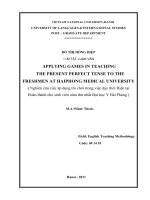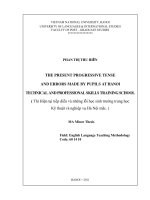THE PRESENT SIMPLE TENSE
Bạn đang xem bản rút gọn của tài liệu. Xem và tải ngay bản đầy đủ của tài liệu tại đây (759.45 KB, 15 trang )
<span class='text_page_counter'>(1)</span>THEMATIC 1 THE PRESENT SIMPLE TENSE.
<span class='text_page_counter'>(2)</span> Fill in the table below. Chủ ngữ. Tính từ sở hữu. Tân ngữ. REVIEW I. My. Me. You. Your. You. We. Our. Us. They. Their. Them. He. his. Him. She. her. Her. It. its. it.
<span class='text_page_counter'>(3)</span> Động từ tobe Cách chia Thì hiện tại đơn. Động từ thường Cách dùng.
<span class='text_page_counter'>(4)</span> English:. THE PRESENT SIMPLE TENSE. 1. Using (Cách dùng): Diễn tả một hành động, một sự việc diễn ra thường xuyên, lặp đi lặp lại hay một thói quen trong hiện tại. Diễn tả một sự thật hiển nhiên, một chân lý. Diễn tả suy nghĩ, cảm xúc, cảm giác.. The I Igosun to school rises inon the feel happy. Monday. East.. She feels sad. The Moon I wash my moves hand around Earth. beforethe meals..
<span class='text_page_counter'>(5)</span> Game: Quickly!!! Sentences 1/ I clean my teeth before going to bed. 2/ I gave her a pencil yesterday. 3/ I am very happy. 4/ She has three cats. 5/ I will play football tommorrow. 6/ I was to school late yesterday. 7/ The Earth moves around the Sun.. True/ False?.
<span class='text_page_counter'>(6)</span> English:. THE PRESENT SIMPLE TENSE. 2. Cách chia: a. Đối với động từ tobe: a.1. Khẳng định:. Công thức:. S + is/am/are. They She (be)… (be) …very my I (be) … a student. friends. happy.. Chú ý:. I + am He, She, It + is We, You, They + are. I am a my student. They She are is very happy. friends..
<span class='text_page_counter'>(7)</span> English:. THE PRESENT SIMPLE TENSE. 2. Cách chia: a. Đối với động từ tobe: a.2.Phủ định:. Công thức:. S + is/am/are + not Khi chia động từ tobe ở dạng phủ định, ta thêm not vào sau động từ tobe. (Chú ý:). is not = isn’t are not = aren’t. We (be, not) … IIt(be, (be,not) not)……happy. new. teachers.. I amItnot happy is not new.now. We are not teachers..
<span class='text_page_counter'>(8)</span> English:. THE PRESENT SIMPLE TENSE. 2. Cách chia: a. Đối với động từ tobe: a.3. Nghi vấn:. Công thức:. Am/Is/Are + S ? Khi chia động từ tobe ở dạng nghi vấn, ta đưa động từ tobe ra đứng trước chủ ngữ. Cách trả lời:. Yes, I am. / No, I am not. Yes, he/she/it is. / No, he/she/it isn’t. Yes, we/you/they are./ No,we/you/they are.. They He(be) (be)… …your a I (be) … a child? teacher? friends?. Are Ithey your Am a child? Is he a teacher? friends?.
<span class='text_page_counter'>(9)</span> Game: Find the correct place! MyYour bedroom shoesand andher mybedroom shoes (be) (be) ……. She (be) …… a not) doctor. This These He We student I(be)… (be)… (be, books not) my (be)… your (be, grandfather. sister? at very home. …as lazy. red. The car (be) … cheap? Everyone (be, not) silly you. expensive? untidy.. A A A A. BB BB C C C C. ••••are isam Are your shoes my shoes expensive? is Iisn’t are your sister? not Are the carand cheap? ••••am Isare your and my shoes expensive? isn’t am Am aren’t not Ishoes your sister? not Is the car cheap?. •• am areI your are aren’t is Is isn’t sister? Isn’t the car cheap?. •• isYour not shoes and my shoes are expensive not?.
<span class='text_page_counter'>(10)</span> English:. THE PRESENT SIMPLE TENSE. 2. Cách chia: b. Đối với động từ thường: b.1. Khẳng định:. Công thức:. S+V. They (take) _____ You She We It He(like) I(play) (watch) (play) (work) (do)______ … _______ _______ … _____ myhard its She (play) _______ photos of our chess homework. football. mother. today. TV. very well. chess very well. wedding.. Chú ý:. I, We, You, They + Vnguyên mẫu He, She, It + V (thêm “s” hoặc “es”). SheYou plays work chess hard very She plays chess IItWe do He likes my play watches its homework. football. mother. TV.very They take photos of today. well. well. our wedding..
<span class='text_page_counter'>(11)</span> English:. THE PRESENT SIMPLE TENSE. 2. Cách chia: b. Đối với động từ thường: b.1. Khẳng định:. Quy tắc thêm “s” hoặc “es” sau động từ thường: Thông thường, ta thêm “s” vào sau động từ thường. Động từ tận cùng bằng s, sh, ch, z, x, o thêm “es”. Động từ tận cùng bằng y thì ta bỏ y rồi thêm “ies”.. Have đi với chủ ngữ ngôi thứ 3 số ít sẽ thành “has”.. watch guess carry wash mix cry fly go. watches guesses washes carries mixes cries goes flies.
<span class='text_page_counter'>(12)</span> English:. THE PRESENT SIMPLE TENSE. 2. Cách chia: b. Đối với động từ thường: b.2. Phủ định:. Công thức:. S + do/does + not + Vnguyên mẫu Đối Chúvới ý: chủ ngữ ngôi thứ 1, ngôi thứ 2 và ngôi thứ 3 số nhiều, ta do not = don’t mượn trợ động từ “do” rồi thêm “not” sau trợ not động=từ, động từ does doesn’t chính ở dạng nguyên mẫu. Đối với chủ ngữ ngôi thứ 3 số ít, ta mượn trợ động từ “does” rồi thêm “not” sau trợ động từ, động từ chính ở dạng nguyên mẫu.. He We I (not She (not It (not (not (not do) go) fly) have) ______ _______ sing) ______ _______ ______ your toaschool. exercises. kite. four a song. legs.. She IHe Itdon’ doesn’t does does t not do not have your sing go a We don’ t fly a kite. exercises. to four song. school. legs..
<span class='text_page_counter'>(13)</span> English:. THE PRESENT SIMPLE TENSE. 2. Cách chia: b. Đối với động từ thường: b.3. Nghi vấn:. Công thức:. Do/Does + S + Vnguyên mẫu ? Khi chia động từ thường ở câu nghi vấn, ta chuyển trợ động từ ra đứng trước chủ ngữ, động từ chính ở dạng nguyên mẫu. Chú ý:. Do + I, We, You, They + Vnguyên mẫu? Does + He, She, It + Vnguyên mẫu?. She He We I (cook) (listen) (live) (go) ________ ______ _____ ______ in camping? Vietnam? dinner? to me?. Does Does he shelisten live Do Dowe I cook go camping? dinner? in Vietnam? to me?.
<span class='text_page_counter'>(14)</span> English:. THE PRESENT SIMPLE TENSE. 3. Dấu hiệu nhận biết: Thông thường, thì hiện tại đơn thường đi kèm với các trạng từ chỉ tần suất sau: Vị trí của trạng từ chỉ tần suất: + Trước động từ thường + Sau động từ tobe và trợ động từ Ngoài ra còn có các cụm từ sau:. always[luôn once, twice, three/four/five/… luôn], usually[thường a xuyên], often[thường], day/week/month… every day/ week/ thoảng], month/ year/ .. . sometimes[thỉnh khi];at rarely=seldom[hiếm on Monday/Tuesday/…; never[không weekends;… bao giờ]… Every morning/afternoon/evening/night.. Your My friend teacher She (often, I usually (go) (sometimes, (always, get) be) watch) ______ ____ fishing. _______ ____ example? angry. TV at night.. My Does friend your She I usually goes teacher is sometimes always often watches fishing. get example? TVangry. at night..
<span class='text_page_counter'>(15)</span>
<span class='text_page_counter'>(16)</span>









